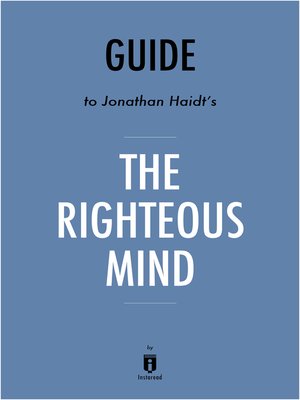
Another had a woman using an old American flag as a cleaning rag. One involved a family who ate their dog after it had died of natural causes. He developed stories designed to bring out moral responses. This fact became clear to Haidt when he did the research for his doctoral dissertation. He concludes that conservatives are sensitive to things that liberals have difficulty seeing. Needless to say, Haidt’s basic claim that our moral outlooks are largely intuitive rather than reasoned refutes the standard liberal presumption that conservatives are motivated by subrational emotions (“fear,” for example) while liberals are “reasonable.” One of the main thrusts of The Righteous Mind is that people tend to be liberal or conservative because they have different emotional responses to the same social realities. It’s the way we’re wired-and for the most part it works well. We should not regret that we feel first and think second. As Haidt argues at some length, our largely intuitive approach to moral reality is very much a part of our evolved nature as social animals.

Reason functions less as a scientist drawing inferences from experiments and more as a lawyer who argues on behalf of the truth of our beliefs-or as a PR agent out to sell our moral intuitions to others, and perhaps even to ourselves. We’re largely intuitive, with analysis and reason-giving mostly justifying beliefs we’ve already accepted as true. He became more and more convinced that our morality flows from our emotional reactions rather than reasoned responses. Now a professor of social psychology at the University of Virginia, as a graduate student at the University of Pennsylvania he studied the moral systems of primitive cultures and did research in Brazil, and eventually India. Haidt tells the story of his intellectual awakening. Kohlberg’s theory was a comforting one for the liberalism that was for many decades in the middle of the twentieth century our ruling ideology, but as it turns out he was wrong about our moral nature. In other words, the mature, morally developed person is a liberal. Kohlberg theorized that children go through stages of moral development, culminating in a “post-conventional” attitude that questions social norms and revises them to accord with higher principles of justice. In the days when Haidt began his work in psychology in the 1980s, the work of Lawrence Kohlberg still dominated.

One that is, I’d say, therefore certainly less reasonable than conservatism’s, and for the vast majority of people in the world far from obvious. When he was a young graduate student, Jonathan Haidt presumed that “liberal” was pretty much a synonym for “reasonable,” if not for “obvious.” Now, as he writes in The Righteous Mind: Why Good People are Divided by Politics and Religion, he has found that liberals have limited moral vision.

It wasn’t a conclusion he thought he’d come to.


 0 kommentar(er)
0 kommentar(er)
